
Marion County is one of the 36 counties in the U.S. state of Oregon. The population was 345,920 at the 2020 census,making it the 5th most populous county in Oregon. The county seat is Salem,which is also the state capital of Oregon. The county was originally named the Champooick District,after Champoeg,a meeting place on the Willamette River. On September 3,1849,the territorial legislature renamed it in honor of Francis Marion,a Continental Army general from South Carolina who served in the American Revolutionary War. Marion County is part of the Salem,OR Metropolitan Statistical Area,which is also included in the Portland-Vancouver-Salem,OR-WA Combined Statistical Area. It is located in the Willamette Valley.

Stayton is a city in Marion County,Oregon,United States,located 12 miles (19 km) southeast of the state capital,Salem,on Oregon Route 22. It is south of Sublimity and east of Aumsville. Located on the North Santiam River,Stayton is a regional agricultural and light manufacturing center. The population was 8,244 at the 2020 census. Established in 1872,it was incorporated in 1891. Stayton is part of the Salem Metropolitan Statistical Area.

The North Santiam River is a 92-mile (148 km) tributary of the Santiam River in western Oregon in the United States. It drains 766 square miles (1,980 km2) of the Cascade Range on the eastern side of the Willamette Valley east of Salem.

Oregon Route 22 is an Oregon state highway that runs between the Oregon Coast community of Hebo,to a junction with U.S. Route 20 near Santiam Pass in the Cascade Mountains. OR 22 traverses several highways of the Oregon state highway system,including the Three Rivers Highway No. 32,part of the Salmon River Highway No. 39,the Willamina–Salem Highway No. 30,part of the Salem Highway No. 72,and the North Santiam Highway No. 162.

The Statesman Journal is the major daily newspaper published in Salem,Oregon,United States. Founded in 1851 as the Oregon Statesman,it later merged with the Capital Journal to form the current newspaper,the second-oldest in Oregon. The Statesman Journal is distributed in Salem,Keizer,and portions of the mid-Willamette Valley. The average weekday circulation was 27,859,with Sunday's readership listed at 36,323,in 2012.. It is owned,along with the neighboring Stayton Mail and Silverton Appeal Tribune,by the national Gannett Company.
West Stayton is an unincorporated community in Marion County,Oregon,United States. It is located four miles west of Stayton,and five miles south of Aumsville.
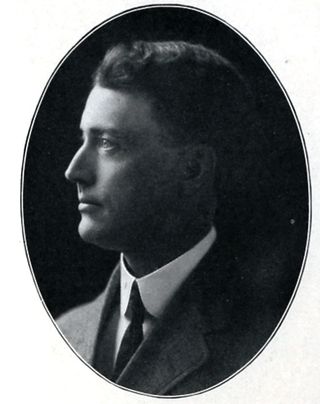
John Hugh McNary was an American attorney and jurist in the state of Oregon. He served as a United States district judge of the United States District Court for the District of Oregon in Portland. A native of Oregon,he also served as a district attorney and as an assistant district attorney in Salem. His brother Charles would serve as a United States senator.

Fred Frank Girod is an American politician from Oregon. He is a member of the Oregon State Senate representing the 9th district,which covers the mid-Willamette Valley,and previously served as the Senate minority leader. He was later succeeded by incumbent minority leader Tim Knopp.
The Salem Metropolitan Statistical Area (MSA),as defined by the United States Census Bureau,is a Metropolitan Statistical Area consisting of two counties in western Oregon,Marion and Polk. The principal city is Salem,the state capital,which has a population of 175,535. The Salem MSA had a population of 433,353 at the 2020 census. In 2010,there were 390,738 people living in the Salem MSA. In 2000,the MSA had a population of 347,214,and had a population of 278,024 according to the 1990 census.
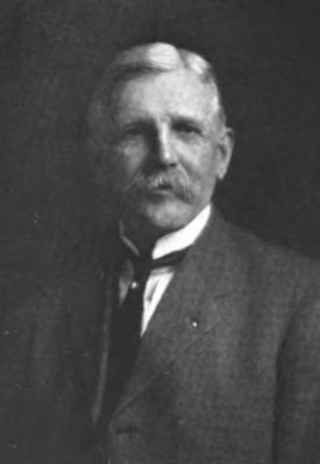
Charles Sumner Moore was an American businessman and politician in the state of Oregon. A native of the Pacific Northwest state,he held several elected offices in Klamath County in the southern part of the state,including county judge. A Republican,he served as Oregon State Treasurer from 1899 to 1907.
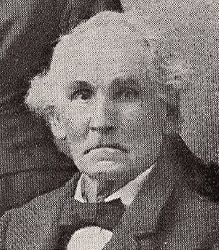
Ralph Carey Geer was an American farmer and politician in what became the state of Oregon. A native of Connecticut,he lived in Ohio and Illinois before taking the Oregon Trail west to Oregon where he started a nursery and later raised livestock and grew flax. At times a Republican and later a Democrat,he served in the Oregon House of Representatives and as the clerk for the county. He was related to both Homer Davenport and T. T. Geer.

Winlock W. Steiwer was an American banker,rancher,and politician in the state of Oregon. Born in the Willamette Valley,he made his name in Eastern Oregon as the founder of a bank and as county judge. A Republican,he twice served in the Oregon State Senate. He pleaded guilty in the Oregon land fraud scandal of the early 1900s.
Alonzo Gesner was an American land surveyor,Indian agent,and politician in the state of Oregon. A native of Illinois,he immigrated as a boy to the Oregon Country with his family where he became a deputy surveyor for the United States government. A Republican,he also was appointed as an Indian agent to the Warm Springs Reservation and later was a member of the Oregon State Senate.
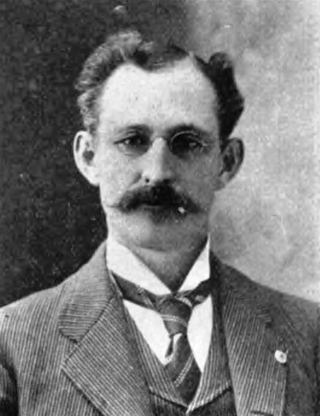
William Henry Wehrung was an American businessman and politician in the state of Oregon. A native Oregonian,he was a cabinetmaker,banker,and merchant in Hillsboro,Oregon. A member of the Democratic Party,he served in the Oregon State Senate and was a longtime member of the Hillsboro city council.

Santiam Hospital is a hospital in Stayton in the U.S. state of Oregon. Established in 1953,the 40-bed facility serves eastern Marion County and the suburbs of Salem.

Stayton–Jordan Bridge is a covered bridge in Stayton in Marion County in the U.S. state of Oregon. Built in 1998,it carries foot traffic over the Salem Power Canal in Pioneer Park. The canal is a diversion from the North Santiam River.
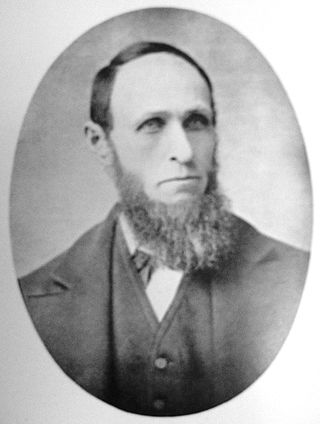
George Washington Shaver was an Oregon pioneer,and,with his sons,a founder of Shaver Transportation Company. He is typically referred to as George W. Shaver or G.W. Shaver.

Cap and Bells was an American-bred Thoroughbred racehorse and broodmare. After showing promising form in the United States as a juvenile in 1900 she was set to race in England. In June 1901 on her British debut she recorded an extraordinary win in the Epsom Oaks,becoming the first American horse to do so. She never recaptured her Epsom form and was retired from racing in 1903. After returning to United States she had some success as a broodmare.
The Silverton Appeal Tribune was a weekly newspaper published in Silverton in the U.S. state of Oregon. It was published by the Statesman Journal;both papers,along with the nearby Stayton Mail,are owned by the national Gannett Company.
The Stayton Mail was a weekly newspaper serving Stayton in the U.S. state of Oregon,founded in 1894. It was published by the Statesman Journal;both papers,along with the nearby Silverton Appeal Tribune,are owned by the national Gannett Company.















